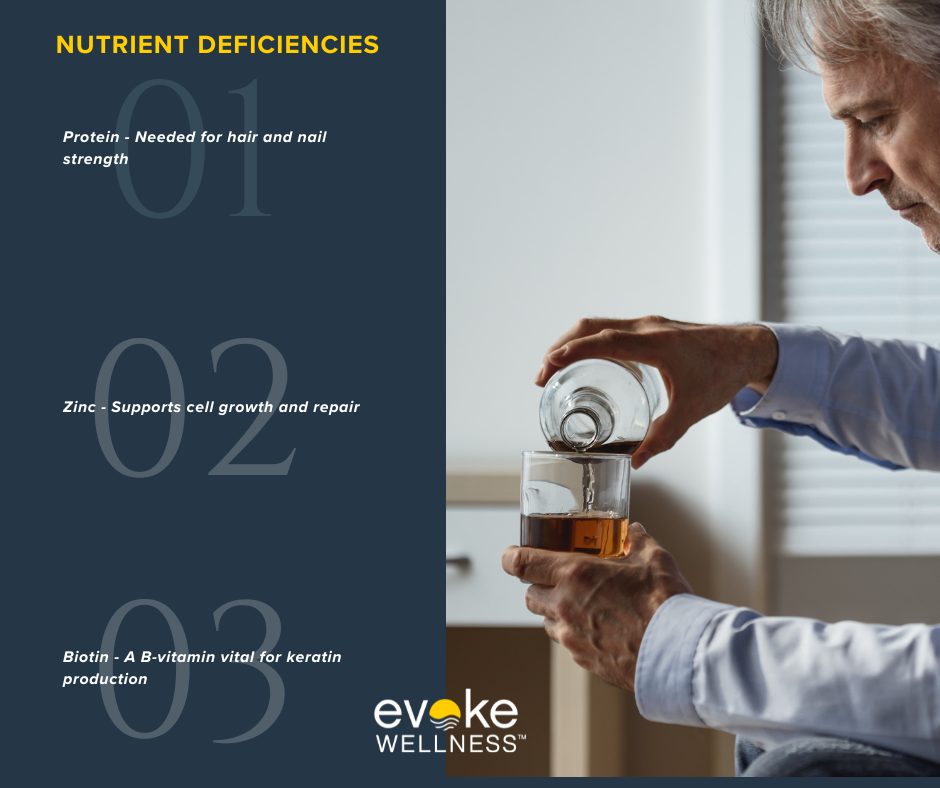As you navigate the complexities of alcohol addiction, understanding the physical characteristics of an alcoholic can be crucial. In Massachusetts alone, excessive alcohol use claims over 1,500 lives annually, according to recent data from the CDC. This sobering statistic underscores the importance of early intervention and comprehensive treatment. At Evoke Wellness at Cohasset, we offer a range of evidence-based programs designed to address the multifaceted nature of alcohol addiction.
By familiarizing yourself with the physical signs of alcoholism, you can take the first step towards recovery for yourself or a loved one.
Together, let’s embrace the journey to recovery and the promise of a new beginning. Call us at (617) 917-3485 today or reach out online.
Common Physical Signs of Alcoholism
Alcohol’s Physical Toll
Alcoholism takes a severe physical toll on the body over time. One of the most visible signs is a flushed or reddened complexion, caused by dilated blood vessels and impaired nutrient absorption. Weight fluctuations, both gains or losses, are also common due to the empty calories in alcohol and its effects on appetite.
Observable Symptoms
More obvious symptoms may include tremors, slurred speech, impaired coordination, and bloodshot or glassy eyes. As alcoholism progresses, withdrawal symptoms like profuse sweating can occur even between drinking sessions. Chronic alcoholics may develop a potbelly or swollen facial features from liver damage and nutritional deficiencies.
Long-Term Health Risks
The long-term health risks of alcoholism are severe, including an increased risk of liver disease, heart problems, certain cancers, and brain function deterioration. Even “functional” alcoholics cannot escape the physical toll over time. Seeking professional treatment through comprehensive detox and rehabilitation programs is crucial to regain control and prevent irreversible damage.
You Have a Reddish Face
A Telltale Sign
One of the most visible physical characteristics of alcoholism is a persistently red or flushed facial complexion, often concentrated on the nose and cheeks. This condition, known as alcoholic redness or “alcoholic nose”, results from the enlargement of blood vessels and increased blood flow caused by excessive alcohol consumption over time.
The Science Behind It
Alcohol is a vasodilator, meaning it causes the widening of blood vessels. With frequent binge drinking or chronic heavy alcohol intake, the blood vessels in the face become permanently dilated and engorged, leading to the characteristic reddish appearance. According to a study, this ruddy complexion is often one of the first subtle signs of functional alcoholism, a condition where individuals maintain a high level of productivity despite struggling with alcohol dependence.
A Wake-Up Call
While an alcoholic nose may seem like a superficial concern, it serves as a visible warning sign of the damaging effects of alcohol abuse on the body. This physical manifestation should prompt individuals to seek professional help and address the root cause of their alcohol addiction before more severe health consequences, such as liver disease, heart problems, or brain damage, develop.
Your Hair and Nails May Become Brittle
Alcoholism can have noticeable effects on your physical appearance, including changes to your hair and nails. Excessive alcohol consumption deprives the body of essential nutrients, vitamins, and minerals required for healthy hair and nail growth.
Nutrient Deficiencies
Chronic alcoholism often leads to deficiencies in nutrients like:
Without these key nutrients, hair may become dry, brittle, and prone to breakage or thinning. Similarly, nails can develop ridges, dryness, and a tendency to split or peel.
Poor Blood Circulation
Alcohol is a vasodilator, meaning it causes blood vessels to relax and widen. While this may initially increase blood flow, long-term heavy drinking can damage blood vessel linings. This impairs circulation, reducing oxygen and nutrient delivery to hair follicles and nail beds.
Diminished blood flow starves the follicles and nail matrix of what they need to produce strong, healthy hair and nails. The result is brittle, lackluster locks and nails that chip or crack easily.
Dehydration Risk
Frequent alcohol binges can severely dehydrate the body over time. Chronic dehydration dries out skin, hair, and nails from the inside out. This makes strands and nails more prone to breakage, split ends, and peeling.
While sometimes subtle, changes in hair and nail quality can be telling signs of alcohol’s toll on the body’s nutritional status and overall health. Seeking help for alcohol addiction can restore these visible qualities.
You May Have Stained or Yellow Teeth
Chronic alcohol abuse can take a serious toll on your dental health. Drinking excessive amounts leads to enamel erosion and tooth discoloration over time.
Enamel Erosion
Heavy alcohol consumption causes enamel erosion – the irreversible loss of the glossy outer layer of teeth. This occurs because alcohol is an acidic substance that wears away enamel.
Damaged enamel makes teeth more vulnerable to staining from other sources like coffee, tea, red wine, and tobacco. The porous, irregular surfaces are difficult to keep clean and become discolored more easily.
Dry Mouth
Alcohol is a diuretic that causes dehydration and dry mouth. Without adequate saliva flow, your mouth cannot properly neutralize acids or wash away food particles and bacteria.
This creates the ideal environment for plaque and tartar buildup that leads to yellow, stained teeth. Chronic dry mouth also increases your risk for tooth decay, gum disease, and oral infections.
Poor Hygiene
Many alcoholics neglect their oral hygiene routines when under the influence. Forgetting to brush and floss allows plaque, tartar, and staining to accumulate rapidly on tooth surfaces.
Untreated tooth decay and gum disease often manifest as darkened, yellowed teeth as well. Seeking alcohol addiction treatment in Massachusetts is crucial for restoring your overall health, including your smile.
Your Belly is Disproportionate to the Rest of Your Body
A Common Sign of Alcohol Abuse
Carrying excess weight around the abdominal area – often referred to as a “beer belly” – is one of the most visible signs of chronic alcohol abuse. Alcoholics frequently have a disproportionately large belly compared to the rest of their body.
The Science Behind It
Alcohol is packed with empty, non-nutritive calories that the body converts and stores as visceral fat around the abdominal organs. Over time, this deep belly fat accumulates, creating the protruding “beer gut” appearance.
A recent study by Harvard Medical School found that alcoholics tend to have higher levels of a hormone called cortisol, which also contributes to increased belly fat storage.
Not Just Cosmetic
While an enlarged belly may seem like just a superficial issue, the associated health risks are serious. Excessive visceral fat raises risks for liver disease, heart disease, diabetes, and other dangerous conditions.
Seeking professional help at an accredited alcohol addiction treatment program like the one at Evoke Wellness Cohasset is crucial. Our acute detox, residential rehab, therapies, and aftercare can help clients regain control and improve their overall wellbeing.
Your Skin Has a Yellow Tint
Jaundice, or yellowing of the skin and whites of the eyes, is a telltale sign of alcoholic liver disease. As alcohol damages liver cells, they are less able to excrete bile properly.
Bilirubin Buildup
- Bile contains bilirubin, a yellow-orange pigment produced when old red blood cells break down
- With liver impairment, bilirubin builds up in the bloodstream, causing a yellowish discoloration
Other Causes
Jaundice can also signal more advanced alcoholic cirrhosis. However, sometimes it indicates unrelated conditions like hepatitis, gallstones, or certain medications. A full medical evaluation is needed.
Seek Treatment
If jaundice is alcohol-related, the most effective solution is to stop drinking completely. Evoke Wellness offers comprehensive alcohol addiction treatment programs, including:
- Acute medical detox to manage withdrawal safely
- Residential rehabilitation for a structured, therapeutic environment
- Counseling, behavioral therapies, and holistic care
Early intervention gives the liver its best chance to heal and recover function before permanent scarring occurs. In Massachusetts, over 1.8 million adults struggle with alcohol abuse each year. Don’t wait – take that crucial first step today.
How Can Facial Features Indicate an Alcohol Problem?
Facial Changes Over Time
Long-term, excessive alcohol consumption can lead to distinct physical changes in facial features. The bloating effects from alcohol cause a puffy, reddish complexion. Dilated blood vessels become visible on the nose and cheeks—a condition called rhinophyma.
Telltale Signs
Some of the most common facial indicators of alcoholism include:
- Reddened nose and cheeks from dilated blood vessels
- Swollen, “puffy” appearance around the eyes and face
- Deep wrinkles and premature aging
- Yellow discoloration in the skin and eyes (jaundice)
Medical Studies
A 2019 study from the University of Missouri found that participants could accurately perceive alcohol consumption levels simply from looking at facial photos. Those with an alcohol use disorder showed more facial aging, distinct blood vessel patterns, and swelling.
Getting Help in Massachusetts
If you recognize these signs in yourself or a loved one, it may be time to seek alcohol addiction treatment. Evoke Wellness at Cohasset offers comprehensive programs including medically supervised detox, residential rehab, therapies, and aftercare planning.
Conclusion
In conclusion, recognizing the physical characteristics of alcoholism is crucial for early intervention and treatment. As we’ve explored, these signs can manifest in various ways, from visible physical changes to subtle behavioral shifts. In Massachusetts, where 17.5% of adults report excessive drinking, understanding these indicators is particularly vital.
If you or a loved one exhibit these characteristics, know that help is available. Evoke Wellness at Cohasset offers comprehensive alcohol addiction treatment programs. By seeking professional help, individuals can overcome the physical and psychological challenges of alcoholism, paving the way for a healthier, alcohol-free life. Remember, recovery is possible with the right support and resources.
Begin Your Journey with Evoke Wellness at Cohasset
If you or a loved one is considering treatment, Evoke Wellness at Cohasset invites you to contact us. Our compassionate team is ready to answer your questions, discuss your needs, and help you take the first steps toward recovery. In Cohasset, you’ll find more than just a treatment program – you’ll discover a community dedicated to your wellness and success. Together, let’s embrace the journey to recovery and the promise of a new beginning. Call us at (617) 917-3485 today or reach out online.





